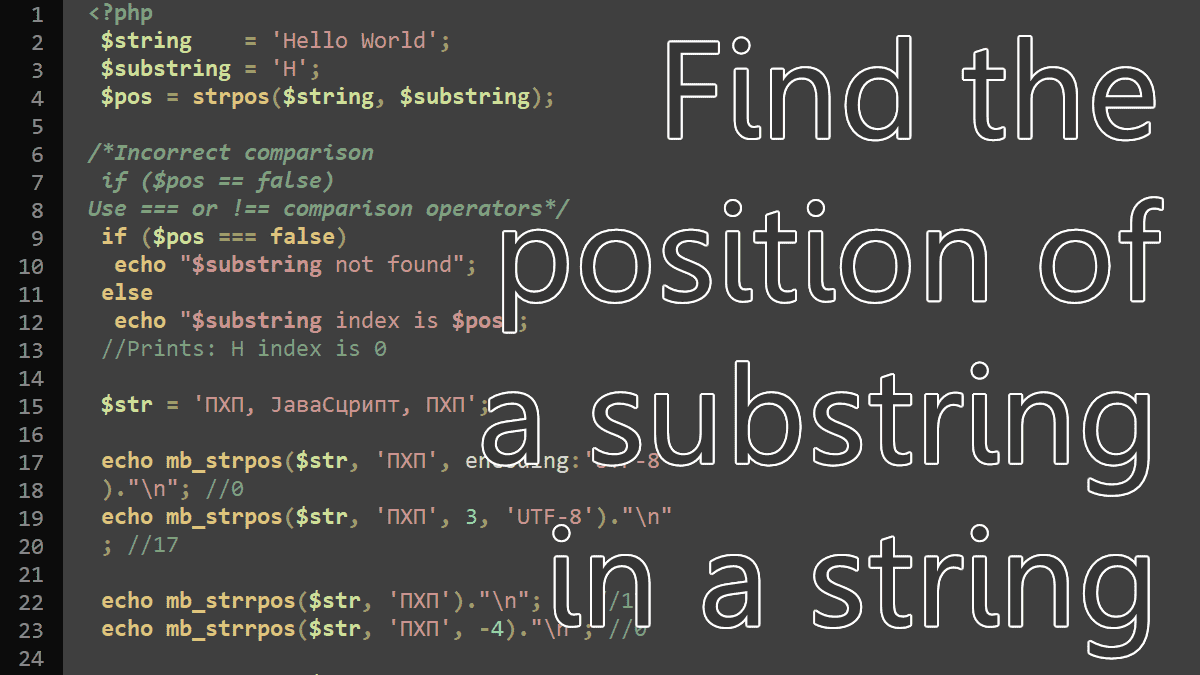When looking for substrings in strings, the following functions are used:
strposfinds the first occurrence of substring and returns its position.
Find all occurrences of a substring.striposworks same asstrposbut it ignores the case.strrposfinds the last occurrence of substring and returns its position.strriposworks same asstrrposbut it ignores the case.- Find the position of a string in a multibyte string.
strpos()
<?php //Syntax strpos(string $haystack, string $needle, int $offset = 0): int|false
This function returns the index of the first occurrence of the substring, or false otherwise.
<?php $string = 'Hello World'; $substring = 'H'; $pos = strpos($string, $substring); /*Incorrect comparison if ($pos == false) Use === or !== comparison operators*/ if ($pos === false) echo "$substring not found"; else echo "$substring index is $pos"; //Prints: H index is 0
The use of == or != operator is incorrect because if string $string happens to start with $substring, strpos() returns 0, which evaluates to false. Therefore, a comparison using === or !== must be used to take the data type into account.
When called with two arguments, the search for the $substring needle is from the start of the haystack $string at position zero. When called with three arguments, the search occurs from the index $offset into the haystack $string. The following examples show how offset works:
<?php $string = 'Hello World'; $substring = 'o'; echo strpos($string, $substring); //4 echo strpos($string, $substring, 5); //7
Example: Find multiple characters
The strpos( ) function can search for multiple characters and returns the index position of the first character. The following examples show how it works:
<?php // 01234567890 $str = 'PHP, MySQL, JavaScript, Lamp'; $sub = 'MySQL'; $pos = strpos($str, $sub); echo "$sub index is $pos"; //Prints: MySQL index is 5
Example: Find all substring occurrences (positions) in the string.
If you need to count the number of times a substring occurs in a string use the substr_count() function. But if you want to determine all substring positions in the string, use a loop with strpos() function. See the following example:
<?php
$str = 'Hello World';
$sub = 'o';
$ofs = 0; //offset
echo substr_count($str, $sub);//2
while (($pos = strpos($str, $sub, $ofs)) !== false)
{
echo $sub .' found at index '. $pos;
echo '<br>';
$ofs = $pos+1;
}
/*Prints:
o found at index 4
o found at index 7*/
stripos()
<?php //Syntax stripos(string $haystack, string $needle, int $offset = 0): int|false
The stripos() function works same as strpos() function, except it is case insensitive.
<?php $str = 'PHP, MySQL, JavaScript, PHP'; $sub = 'php'; $pos = stripos($str, $sub); if ($pos !== false) echo "$sub found at index $pos"; //Prints: php found at index 0 /*var_dump( strpos($str, $sub) ); //bool(false)*/
strrpos()
<?php //Syntax strrpos(string $haystack, string $needle, int $offset = 0): int|false
This function searches from the end of the string. It returns the index of the last occurrence of the substring, or false otherwise.
Example: Find last occurrence of string
<?php $str = 'PHP, MySQL, JavaScript, PHP'; $sub = 'PHP'; $pos = strrpos($str, $sub); //24 //echo strpos($str, $sub); //0 if ($pos !== false) echo "$sub found at index $pos"; //Prints: PHP found at index 24
strripos()
<?php //Syntax strripos(string $haystack, string $needle, int $offset = 0): int|false
The strripos() function works same as strrpos() function, except it is case insensitive. This function finds the position of the last occurrence of a case-insensitive substring in a string.
<?php $str = 'PHP, MySQL, JavaScript, PHP'; $sub = 'php'; $pos = strripos($str, $sub); if ($pos !== false) echo "$sub found at index $pos"; //Prints: php found at index 24 /*var_dump( strrpos($str, $sub) ); //bool(false)*/
Find the position of a string in a multibyte string
<?php //Syntax mb_strpos( string $haystack, string $needle, int $offset = 0, ?string $encoding = null ): int|false
Use the following functions if you are dealing with multibyte strings, these functions accept an additional parameter $encoding for the character encoding. If the $encoding parameter is omitted or null, the internal character encoding will be used.
mb_strpos()works same as strpos().mb_strrpos()works same as strrpos().mb_stripos()works same as stripos().mb_strripos()works same as strripos().
The multi-byte safe functions work based on the number of characters in a string. The first character’s position is 0, the second character’s position is 1, and so on.
<?php $str = 'ПХП, ЈаваСцрипт, ПХП'; //Using named argument 'encoding' echo mb_strpos($str, 'ПХП', encoding:'UTF-8'); //0 //Setting character encoding in 4th parameter echo mb_strpos($str, 'ПХП', 3, 'UTF-8'); //17 //Omitting encoding parameter echo mb_strpos($str, 'ПХП', 3); //17
Example: Using mb_stripos, mb_strrpos, and mb_strripos
<?php $str = 'ПХП, ЈаваСцрипт, ПХП'; echo mb_strrpos($str, 'ПХП')."\n"; //17 echo mb_strrpos($str, 'ПХП', -4)."\n"; //0 echo mb_stripos($str, 'пхп')."\n"; //0 echo mb_stripos($str, 'пхп', 3)."\n"; //17 echo mb_strripos($str, 'пхп')."\n"; //17 echo mb_strripos($str, 'пхп', -4)."\n"; //0 $pos = mb_strpos($str, 'пап'); if ($pos === false) echo 'пап not found'; else echo "пап found at position $pos"; //пап not found
Manipulating substrings:
